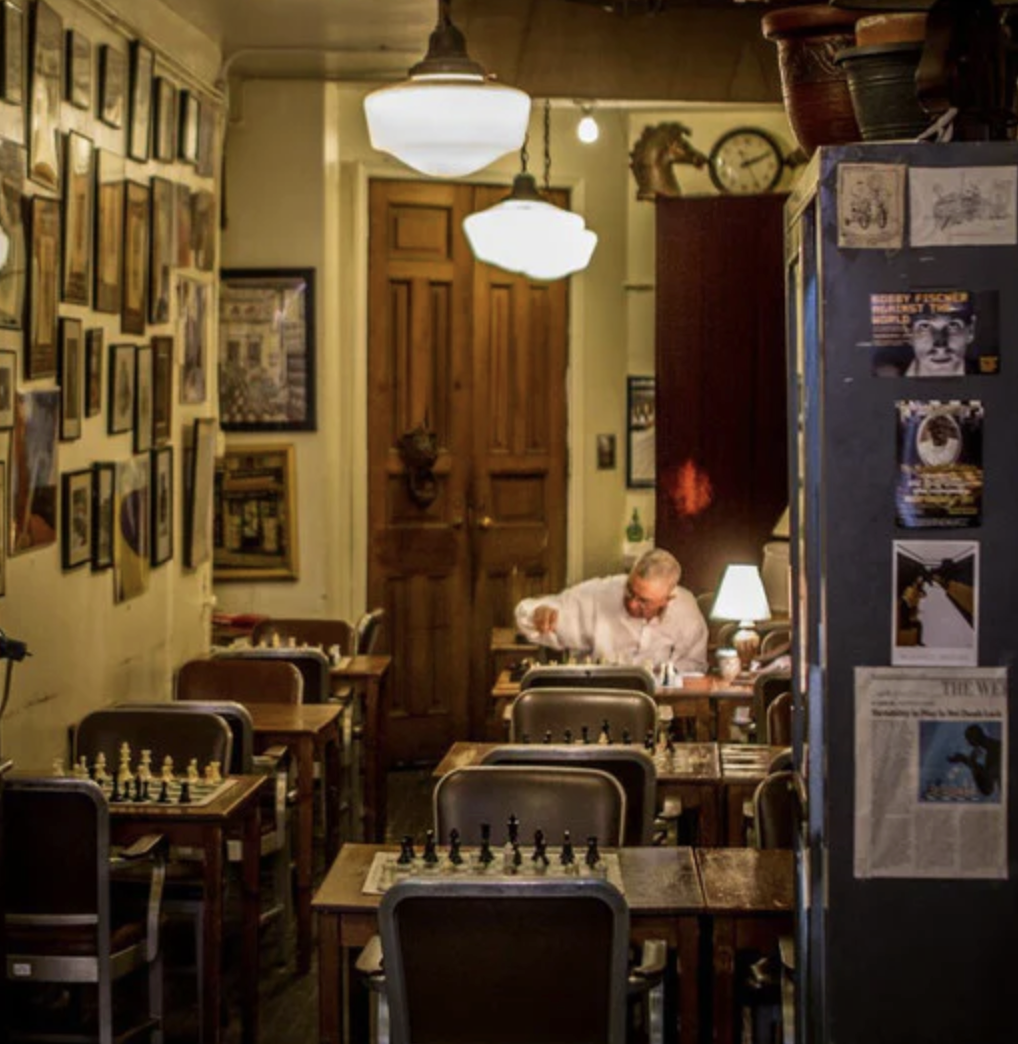At the Chess Forum store in Greenwich Village, manager Imad Khachan has squeezed twelve chess tables in a narrow annex that burrows into the block like a rogue finger. In this annex sits twenty-four chess players of all stages of life — from young adult to maybe-they’re-a-grandparent-but-maybe-they’re-not. Five of the players are women, which far outstrips the stunningly lopsided global ratio of 37 female international grandmasters out of the 1,600 total.
In one game, the black pieces have been let loose, unfettered; the opponent finds himself without room to maneuver, and now must decide whether to save his knight or his bishop from a mere pawn that is poised to strike either one. The two players at the next table over are trading pieces with hasty insouciance and taking turns to press the timer in nearly perfect rhythm. Click-clack-click-clack. Bishop, rook, queen, other bishop; they’re like cows who make it to the slaughterhouse at the back of the line. They survive for longer than the pawns, but in the end, they are just as dispensable as the rest.
“No two chess games are the same,” said Imad. “That’s why people like to play over and over again.” When I return to the store in the evening, some tables are empty, and there are new faces — but a few of the players from earlier still remain. I observe one of them, a middle-aged man with hair that is kempt on one side and unkempt on the other. He never notices my fascination, because his eyes never leave the chessboard. My fourth-grade teacher once told me that if I look at one thing for too long, then I cannot unsee it even against my wishes. Over the phone the next day, Imad gets right to the point. “Some of them are addicted,” he said.
Imad is reluctant to single out any one of his customers; he wants to respect their privacy. Even if a chess player is addicted, there is no official diagnosis because chess addiction is not recognized in the DSM-5. In any case, Imad said, there are much fewer potential addicts at the Chess Forum than there were in the 2000s and 1990s. “They’ve mostly moved online,” he said, referring to chess.com and other online chess sites that have exploded in popularity over the last decade.
The movement of chess from the wooden board to the pixelated screen has raised further comparisons between chess addiction and internet gaming disorder, which does have its entry in the DSM-5 as a diagnosis under consideration. The telltale signs include withdrawal symptoms, the need to spend more time to satisfy the urge, unsuccessful attempts to quit, the diminishment of other activities and interests, and the use of gaming to relieve negative moods such as stress. The American Psychiatric Association sums up this addiction aptly, describing it as “an inescapable part of many people’s lives.”
While chess can be addictive in either medium, Imad recognizes the unique appeal of online chess — an appeal that drew many of his more “committed” customers away. “For an addict, whose mind is singularly focused on chess,” Imad posits, “being able to play from the comfort of home cuts out the hassle of getting dressed and showing up.”
The addicts who used to frequent his store but then presumably went online have not kept in touch. Imad sighs as he recalls their state of mind and body when last he saw them. “One of them had been fired from his job for always showing up late,” he said. “Then, his wife divorced him, taking their two kids with her.” As owner of the store and adjacent chess-playing area, Imad sees all whenever he is around. But he almost never intervenes even as he watches people slowly self-destruct. “It’s not my place to do that. I’m not their caretaker. The most I do is give them the phone, whenever one of their family members call demanding they come back home.” Sometimes, perhaps after multiple attempts from a distance to reel them in, an exasperated spouse would come in person to drag a chess player home, if not to their senses.

Although Imad diligently guards his patrons’ anonymity, Reddit presents much more open ground to find some talkers. Almost all the Redditors I speak to say they never see the addiction coming and demonstrate several of the symptoms associated with internet gaming disorder. “By the time you shake yourself out of a run of games and realize you might be addicted,” one Redditor said, “it’s too late to climb out.” The moments when one becomes conscious of their addiction are not only as diverse as the effects of addiction on their lives — they are also reflections on how addiction has indeed thrown their lives in disarray. Another Redditor, pdx_simp, came to the realization when he lost a game to his wife one day. “It wasn’t the first time I lost to her,” he recalled. “But I was so upset about it that I could barely speak to her for an entire weekend.”
The juxtaposition of realization and the seeming acceptance of their fate is unsettling. The frogs have realized now that the pan is heated, but they’re still not jumping out. Pdx_simp is matter-of-fact, even serene, as he describes life under the omnipresence of chess. “My resolution for the next year is to improve my Elo How dumb is that?” He has not seriously considered any alternative resolution.
Even when they’re not sitting in front of a chess board or a computer screen, the game seems to haunt some addicts. “When I close my eyes and try to go to sleep,” said an anonymous Redditor, “all I see are giant chess pieces surrounding me on a giant chess board.” A Redditor named nihilistiq sought therapy from a gaming addiction specialist, who suggested that he put his excess of “chess energy” somewhere else, like in a poem:
Yes I’m an addict
From the moment I wake I’m up and at it
Chasing the magic
Strategy and tactic
Brain’s set on automatic
I win I’m ecstatic
I lose and it’s tragic
I’m manic, I panic
My thoughts they’re erratic
I’ve had it
See the knife and I grab it…
…now I’m in a room that is padded
Wish I’d never become a chess addict
And end up in a straitjacket.
Nihilistiq clarifies that he never actually tried to stab himself, nor did he end up in a straitjacket at some mental hospital. But writing the poem gave him some clarity. “I wrote and then read the poem, and it’s a sad existence that I’m putting down on paper,” he said. “The fact that I am in a place where I can, where I am associating myself with the people who would end up in a straitjacket… that’s not a good place to be.” He had been seeking therapy for a year, but the visits are erratic. His contributions to chess subreddits are far more consistent than his appearances at the psychiatrist’s office, he said. As of now, nihilistiq is still in that place he abhors. “I see a way out, maybe, but it’s just not easy to take that way out right now.”
Imad himself had been possessed by chess addiction, many years ago. Part of the problem was that he kept improving with each additional game—or at least, that’s what he believed, even as he achieved higher status and the returns withered away into marginality. In a way, the hunt for every possible scrap of advantage fuel the addictive nature of the game. “When you feel like you haven’t achieved enough in one game,” Imad explained, “you start another, to get what you had been seeking.”
With cigarettes and alcohol, psychologists typically instruct their patients not to cut down, not to moderate, not to take a break — but to quit completely. Imad did the same with chess. “I cannot and will not return to playing,” he said. So far, Imad has kept to his word; he hasn’t played a single game for fifteen years. Even his exposure to developments in the chess world is kept to a healthy limit.
Once someone has overcome an addiction, the goal is to avoid falling back into the pit. Addiction specialists often maintain that changing one’s life and remaining faithful to self-imposed rules are essential to avoiding a relapse. “A relapse begins weeks and sometimes months before an individual picks up a drink or a drug,” wrote Steven M. Melemis in the Yale Journal of Biology and Medicine. “Their emotions and behaviors are setting them up for relapse down the road… because they are not consciously thinking about using during this stage, denial is a big part of emotional relapse.”
Even as he witnesses dozens of games every day, Imad has stayed true to his word. “I don’t miss [chess],” he said. “If a yearning comes, I step on it and think about something else.”
The Chess Forum itself provides another solution for Imad. Although it had opened before Imad overcame his chess addiction, the fact of its continued existence is an outlet for him to channel his now-latent chess energies. “I still obviously have a relationship with chess,” he said. “I run this store. I buy all sorts of chess sets with different themes and designs.” Some sets on display contain pieces in their traditional form, but made out of different materials like metal or unvarnished wood. Others substitute the abstract designs with real historical figures. The American Civil War set, a staple from custom board makers, would be familiar to almost all visitors, but the set pitting the Ottoman Turks against the Mamluks of Egypt would probably not. More still leap outside the realm of reality, like the set of Nintendo’s Mushroom Kingdom (the setting of Mario’s adventures) characters, the koopas looking far more menacing in “the flesh” than they do on the screen.
Refocusing one’s energy to overcome addiction is often an effective tactic, even if it provides only a stopgap measure in some cases. Imad’s store runs a chess meetup every Thursday for people dealing with alcoholism. But on occasion, a person would escape from the grip of alcohol only to fall into the den of chess. “Sometimes, it’s just their addictive personality,” Imad suggested. “I can help some people, but not everybody.” One person who frequented his store replaced alcohol with chess and became a grandmaster in the process. But Imad does not know if he is addicted or not. “Usually, a grandmaster hovers around the borderline. You can’t really be this good at chess without playing a lot… perhaps too much to be good for you. But then again, the same is true for sports, no?”








